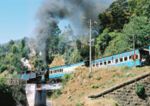Nilgiri Mountain Railway
| Nilgiri Mountain Railway | ||
|---|---|---|
 Class 'X' on up train at Kateri Road | ||
| Line of route | ||
| Mettupalaiyam to Ootacamund | ||
| Gauge / mileage | ||
| Metre gauge | 17 miles (1905) 29 miles (1908) | |
| Timeline | ||
| 1885 | First company formed | |
| 1899 | First section opened to traffic | |
| 1903 | Line purchased by GoI | |
| 1908 | Construction completed by PWD | |
| Key locations | ||
| Presidency | Madras | |
| Stations | Mettupalaiyam, Coonoor, Ootacamund | |
| System agency | ||
| 1899-1907 | Madras Railway | |
| 1908 | South Indian Railway | |
| 1951 | Southern Railway (IR zone) | |
| How to interpret this infobox | ||
A metre gauge rack railway that is today a tourist attraction and a UNESCO World Heritage Site. Diesels can only haul NMR trains on the top section between Coonoor and Ooty.
History
Following the opening of the Madras Railway broad gauge line from Madras to Calicut in 1862, a 26 mile, broad gauge branch from Podanur to Mettupalaiyam was opened to traffic in 1873 and plans discussed to extend this into the Nilgiri Hills - the "Blue Mountains".
In 1885, the Nilgiri Railway Company was formed with construction beginning in 1891. Initially, it was intended to adopt the Rigi rack system but eventually the Abt rack system was chosen. In 1896, a new company was formed with a guarantee (3% return during the construction period) from the Government of India (GoI) following the failure of the 1885 company.
In 1899 the first section, from Mettupalaiyam to Coonoor (including 12 miles of rack), was opened to working by the Madras Railway. In 1903 the GoI purchased the line and contracted its working to the Madras Railway.
When the Madras Railway was merged into the Madras and Southern Mahratta Railway in 1907, the NMR contract was awarded to the South Indian Railway. Construction of the extension from Coonoor to Ootacamund was completed by the GoI Public Works Department in 1908.
In due course, the NMR became part of Southern Railway, a zone of Indian Railways.
Gallery
-
The Nilgiri Mountain Railway.jpg -
At Coonoor station -
Looking back up the track -
Through a tunnel -
Ooty Station sign -
At Ooty Station
External links
- "The Nilgiris" Love to know 1911.
- "Nilgiris District" Wikipedia.
- "Nilgiri Mountain Railway" Wikipedia.
- "Heritage Site" The Nilgiris - District of Blue Mountains.
- "Rack railway" Wikipedia.
- Indian Hill Railways The Nilgiri Mountain Railwayyoutube.com One hour BBC documentary film.
- A day trip on the Ooty train Lovely series of photos from BCMTouring.com